Story by Rick Vacek
Photos by Ralph Freso
GCU News Bureau
Havilah Houston took a chance.
Her predecessor as President of TEDxGrandCanyonUniversity, Steven Owens, had asked what she wanted her legacy to be. She decided that she wanted the sixth annual event to be the biggest TEDxGCU of them all.
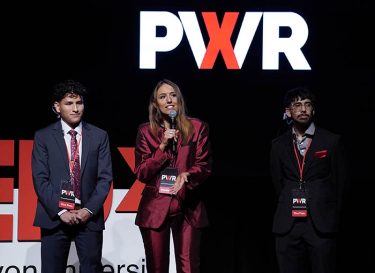
“So I thought, ‘What better place than the Arena?’” she said.
As in Grand Canyon University Arena, where the student-run event was held in its first year. Back then, the organizers were just learning how to put together a gathering of this magnitude. Friday was the opportunity for this year's group to show how well TEDxGCU has evolved, but ...
“We took a lot of risk,” said one of Houston’s vice presidents, Luis Peña Espinoza. “We didn’t know how it would be coming into the Arena because it’s so big and there are so many logistical variables. But we were ready to take it on because of its potential.”
Friday night, they showed how much they’ve learned in six years – and certainly reached their potential. The move to the Arena proved perfect, both for the setting and the ticket sales. (See slideshow here).
They sold approximately 700 tickets, twice as many as any previous year, and with free admission for students on a Discover GCU trip and from local high schools, the crowd swelled to 1,100. They also doubled their revenue.
Couple that with the nine TED talks, and attendees had three hours to remember “Power,” the name organizers gave this year’s event. But maybe no one should have been surprised. Houston certainly wasn’t.
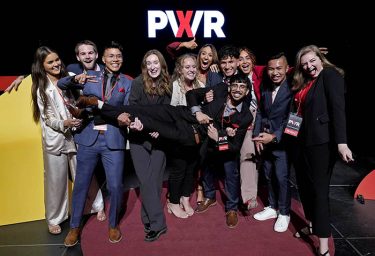
“Actually, it went exactly how we expected,” she said. “If you had been in the room with us eight months ago and you heard our initial vision, this was our vision come to life, which is really cool to be able to say.”
The students had everything under control to such a degree, they left the Arena at 5 p.m. the day before, confident that all the TEDx t’s had been crossed, and didn’t return until six hours before the start.
“Our team has been so easy to work with, everything we’ve done has been so flawless, that it hasn’t been as much work as it could have been,” Houston said. “I had full faith and confidence that it was going to turn out like it did.”
But that doesn’t mean it was without other risks along the way.
In fact, when you think about it, the process that leads to a TED talk requires both the students choosing the speakers and the speakers themselves to take a chance.
The students have to trust that it will be a well-received topic.
The speakers need the ability to craft their message and share it effectively on the TEDx red dot.
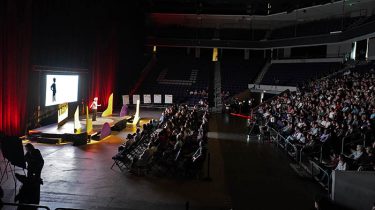
That’s why it takes eight months of working 15-20 hours a week to create it and produce it, which the students do almost entirely on their own under the auspices of the Project Management Club in the Colangelo College of Business and the club's faculty advisor, instructor Paul Waterman. When it works, you have what happened Friday night.
"All venues are unique, and each TEDx event is purposefully curated," Waterman said. "All of this presents both opportunities and challenges for the TEDx team to work through. As well-known as TED is, the true value of the students' work is in owning the envisioning, planning and executing of such a complex event. When it works, we get to enjoy what happened here tonight, but the students on the TEDx team get a 'been there, done that' edge that will last a lifetime."
Because life decisions and careers are filled with risks. Here’s how the TEDxGCU risks turned into rewards.
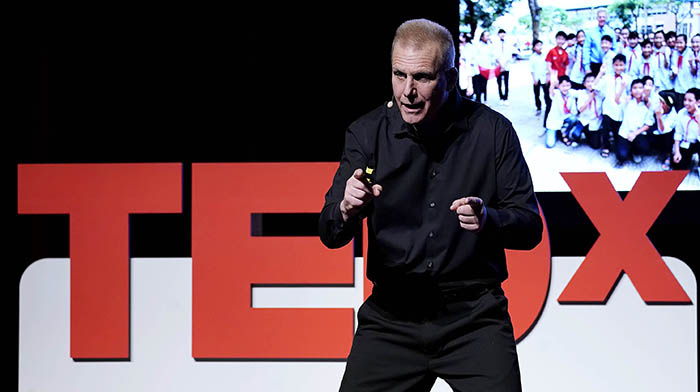
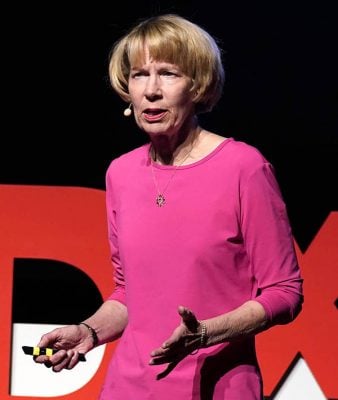
It was clear from the first presentation that this would not be a night to play it safe. Raelene S. Weaver’s “Let Boys Be Kids First” tackled a tough topic – male teen sex offenders.
The licensed marriage and family therapist has found her niche working with these teenagers and argued that society needs to create a safe space for young boys to feel as if it’s OK to share their feelings as they learn how to be respectful and responsible.
Then Keith Ballard ripped the Band-Aid off K-12 education in the U.S. with his “Stealing from the World’s Best Schools.”
Talk about taking risks: Ballard described himself as “eccentric” and “an adrenaline junkie” as he listed all the challenges he has taken on over the years, everything from surviving in the jungle to skydiving.
But he fears that the U.S. educational system is the one that is crashing to earth without a parachute.
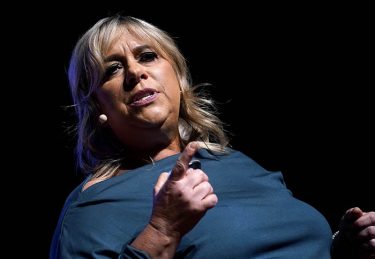
Troubled by what he sees as a middle school educator of underprivileged kids at a California school near the Mexican border, Ballard has visited 170 schools overseas and was stunned by their superiority.
For example, a Singapore school with an aviation education program has a fully accessible passenger jet parked on the grounds. In his town, a program designed to create future auto mechanics has only one vandalized, unusable car.
Next was a more lighthearted look at another sensitive subject. In “Standing Alone: The Ultimate Widow Superfixer,” Mary Oves told the humorous story of how the simple act of changing a light bulb on her porch, something her late husband or her sons always did before, inspired her to take risks.
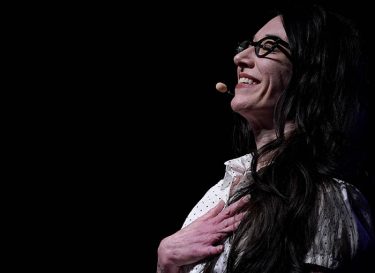
About three-quarters of widowed people in the U.S. are women (“Women mourn; men replace,” she said), and she urges them to overcome stereotypes and march ahead with confidence.
The last talk of the first set, “The Medicinal Value of Poetry,” detailed Dr. Rosemarie Dombrowski’s struggle to find ways to soothe her special-needs son while he was growing up. He’s now 23.
The answer was poetry.
“Poetry has saved my life,” she said.
She suggested that it could do the same for cancer patients, trauma victims and people with post-traumatic stress disorder.
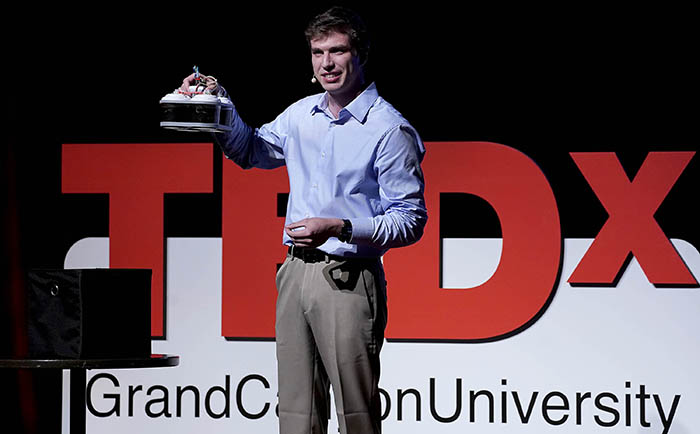
After an interactive intermission that included a light show upstairs in the Arena, the second half of the program began with another risk – the first current GCU student to give a talk at the event since its first year. The organizers were so determined to include a student, they expanded the evening to nine presentations rather than the customary eight.
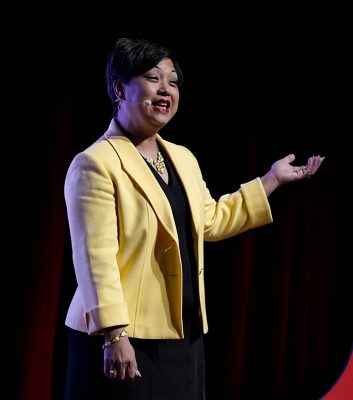
But this was no ordinary student. It was Erik Yost, who has made big news on campus by leading a team that is sending a microbial fuel cell to the International Space Station this month. Naturally, that was Yost’s topic in “The Loop of Discipleship.”
Yost has done plenty of presentations at conferences and the like but said it was “really cool to be able to share an idea like this to such a vast and diverse audience.”
Equally cool was the assistance he received from Isai Gomez, TEDxGCU’s Co-Director of Speaker Acquisition. The pair met just about every week, sometimes twice a week.
“Very helpful,” Yost said. “He went through my speech, broke it down, rebuilt the speech again, broke it down again.”
Dr. Abby Hamilton, a second-generation Filipino-American, delivered an inspirational talk on “Breaking the Bamboo Ceiling,” explaining how their culture affects Asian Americans in the workplace.
Like so many of her peers, her parents taught her to be humble. “In Asian culture, the nail that sticks out gets the hammer,” she said. Her career, which now includes daily videos on social media and a YouTube channel, changed when she learned to be more assertive.
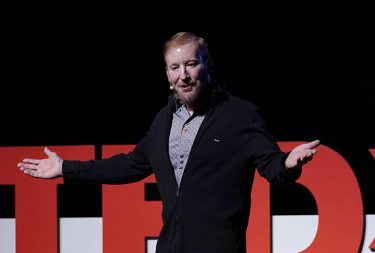
Then came the talk that might have been the riskiest of all. Again, it was a tough topic. Dr. Kevin Haselhorst of Scottsdale is an emergency room physician who advocates for a patient’s right to go into hospice, and he made his case in “Real Serious Illness Conversations with Parents.”
Haselhorst has seen it all in his 30 years of emergency room medicine. “Life lessons are abundant in the E.R., and each session is a ‘Ripley’s Believe It or Not,’” he said, adding that nurses call him “Dr. Hospicehorst.”
But what he has seen most of all is families determined to save Mom or Dad, no matter what.
“The dutiful don’t do hospice,” he said. “They expect miracles.”
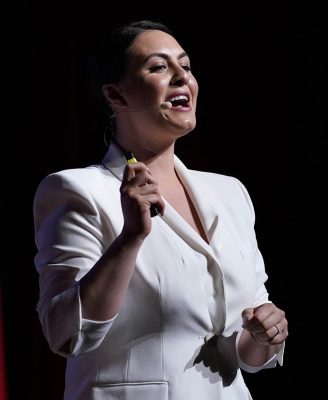
The fact that Haselhorst got to give his talk is a little bit of miracle. “Divine intervention,” he called it. He had applied to 15 or 20 TEDx venues without getting a response before coming across TEDxGCU in a web search just two days before its deadline.
He was pleasantly surprised when the TEDxGCU team reached out to him right away even though he forgot to put his proposed subject in the application. Even when he messed up the answers the second time through, Abbie Gage of the Speaker Acquisition Team helped him straighten it out.
The students undoubtedly saw the value of a subject that isn’t often discussed. Rocco Berbetti, Vice President of Content Creation, said he never had thought about it before.
“Nobody wants to think about their parents dying, but it’s something that is necessary to talk about rather than just an in-the-future, putting-it-under-the-rug type of scenario,” he said. “Now I get to have the conversation with peace of mind, knowing that it’s OK to talk about what happens at the end.”
Haselhorst had the same sense of peace.
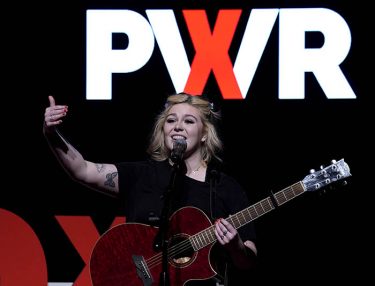
“Oliver Wendell Holmes once said, ‘Don’t die with the music in you.’ I got the music out tonight,” he said.
The final two presentations took chances in other ways:
- “Why I Was Afraid of Rockets: The Importance of Languages in Science,” in which Iraqi immigrant Diana Alsindy advocated for making STEM available in languages other than English.
- “Is It Really ‘Love?’”, in which singer/songwriter Leanna Firestone got the music out with tunes about what true love looks like and the need to believe that we deserve that love as much as attention.
****
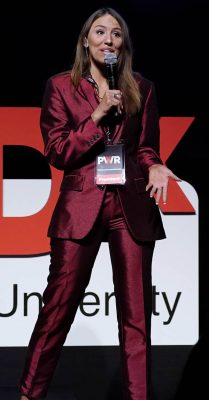
Finally, there’s the annual TEDxGCU fashion risk – the red suit the president traditionally wears.
Her curiosity piqued, Houston tried it on last year and was surprised to find out that what fit Owens also fit her. All she had to do was have the hem let out a couple of inches in the legs. Owens gifted a second red suit to the group, but she didn’t need it.
Next year, the suit goes to Berbetti, the new president. But as Houston and Peña graduate, they have left him with much more than those bright threads.
“It’s both daunting and exciting because they left me with big shoes to fill and a lot of room to grow because of what they instilled in me,” he said. “I get to try to be more like them but at the same time put my own twist in it. It leaves me room for growth but also to express myself.”
In other words, he’ll take some risks … and then try to leave nothing to chance.
Contact Rick Vacek at (602) 639-8203 or [email protected].
****
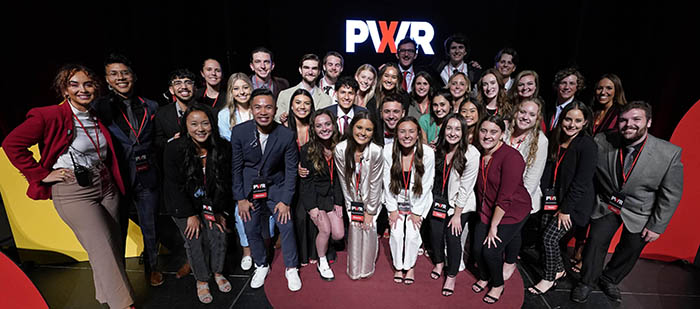
TEDxGCU 2022
DIRECTORS
- Havilah Houston, President and License Holder
- Luis Peña Espinoza, Vice President of Operations and Development
- Rocco Berbetti, Vice President of Content Creation
- Harley Hawk, Director of Finance
- Sarah Brossow, Director of Design
- Isai Gomez, Co-Director of Speaker Acquisition
- Daniel Ferrington, Co-Director of Speaker Acquisition
- John Daniel Ducusin, Director of Marketing
- Meësha Fific, Director of Production
- Elise Martinson, Co-Director of Operations
- Vanessa Harris, Co-Director of Operations
- David Elm, Main Event Host
TEAM
- Speaker Acquisition: Abbie Gage, Fatima Avalos, Maddie Tritch, Madison Isa-Real, Nicole Johnson, Riley Bricker, Sammie Wunner
- Marketing: Lillian Scoglio, Mollie Leiva, Paige Loeffler
- Production: Aiden Sundin, Andrew Niedziela, Katie Potter, Megan Ravelo
- Design: Devin McClelland, Luke Coco
- Operations: Alissa Gustafson, Grace Good, Jacob Warren, Josie Martus, Paul Andrews
- Finance: Caleb Rutter, Ryan Hague
****
Related content:
GCU Today: Catalyst propels high school students' TEDx skills
GCU Today: TEDxGCU verifies students' pandemic perseverance
GCU Today: New tradition suits GCU's stylish TEDx production



































































